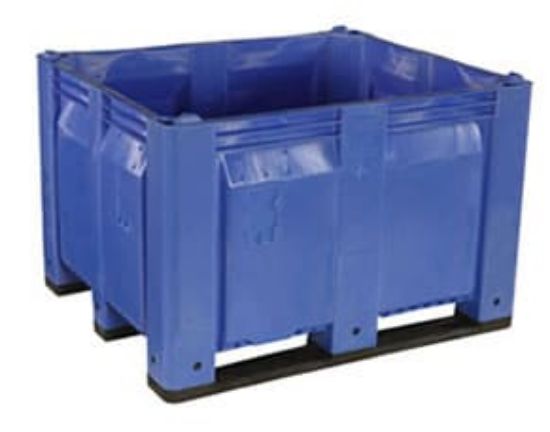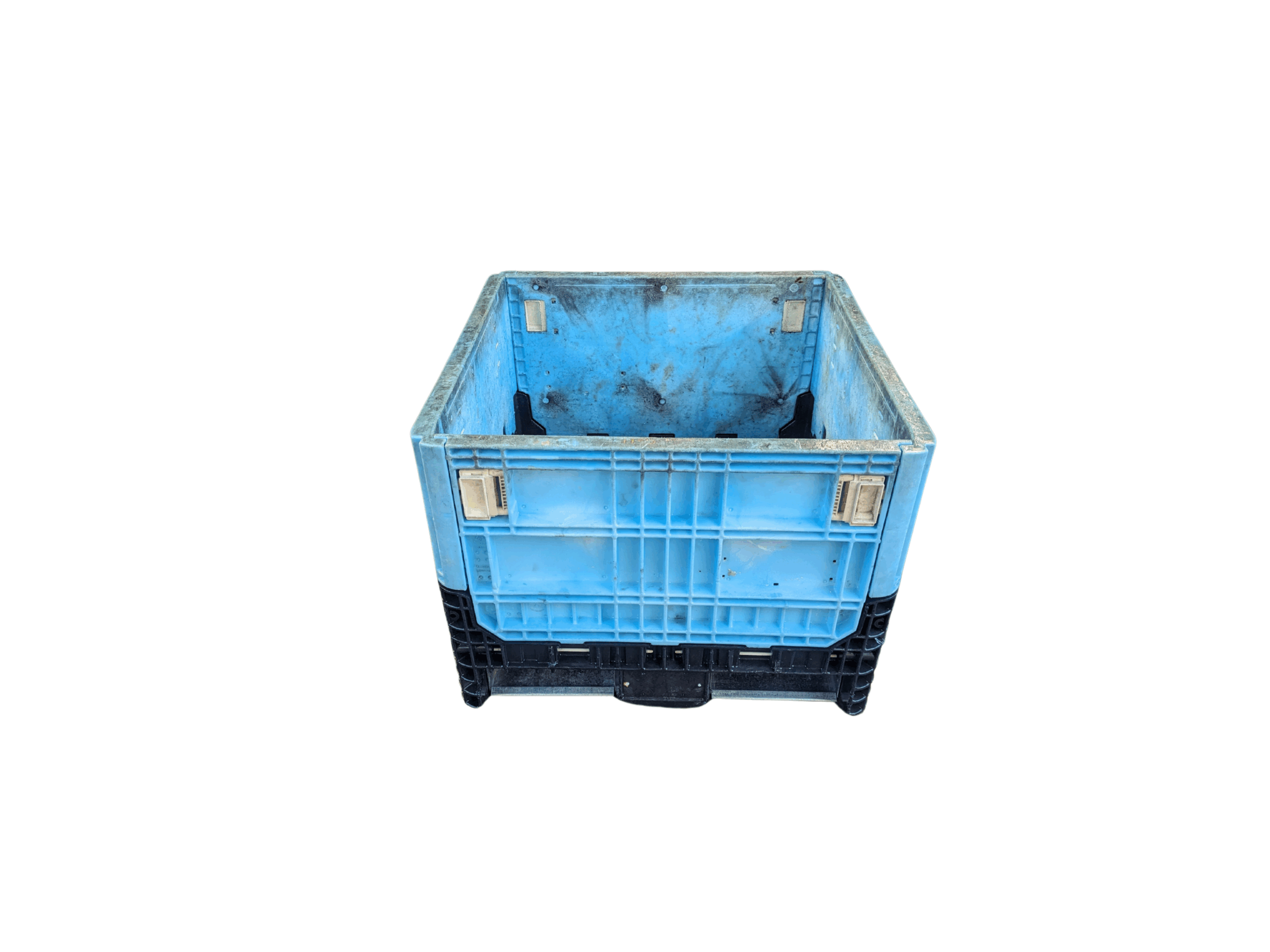Why Bulk Containers Are Important for Sustainable and Affordable Transport
Mass containers play an important role in modern logistics. They help with the effective motion of large amounts of products, therefore maximizing transportation procedures. This approach not only decreases costs but additionally decreases ecological effect via reduced exhausts and waste generation. As markets look for more lasting practices, the adoption of bulk containers is ending up being significantly considerable. What effects does this shift hold for future logistics and supply chain monitoring?

The Advantages of Utilizing Bulk Containers in Logistics
Mass containers change logistics by boosting efficiency and sustainability. These containers permit the transportation of big amounts of items in a single journey, substantially lowering the variety of journeys required. This not only streamlines procedures but additionally lessens labor costs related to handling, loading, and dumping. Furthermore, mass containers are designed to enhance room application within transportation cars, ensuring that even more products can be delivered concurrently.
The standardization of mass containers also streamlines the logistics procedure. With uniform dimensions, they can be conveniently stacked and kept, resulting in enhanced storehouse monitoring. Mass containers often feature sturdy materials that protect components from damages during transportation, therefore reducing item loss and increasing general integrity. Therefore, organizations can experience improved supply chain efficiency, ultimately resulting in boosted profitability and consumer contentment. This combination of aspects makes bulk containers a critical possession in modern logistics.
Ecological Effect: Lowering Waste and Carbon Footprint
As sectors progressively prioritize sustainability, the adoption of mass containers has emerged as an essential technique for lowering waste and reducing carbon footprints. These containers reduce using product packaging materials, such as boxes and plastic, thus significantly reducing general waste generation. By combining deliveries, mass containers boost transportation performance, enabling for more items to be transported per journey. This decrease in trips directly correlates with lower greenhouse gas emissions, contributing to a smaller sized carbon footprint.
Bulk containers can usually be reused or recycled, even more minimizing environmental influence. The toughness of these containers assurances they can endure numerous transportation cycles, reducing the demand for single-use alternatives. used plastic containers. By improving logistics and advertising effective source usage, mass containers not just sustain lasting techniques however additionally motivate industries to align with worldwide environmental objectives. Inevitably, their application reflects a commitment to ecological stewardship and accountable source monitoring
Price Cost Savings: Exactly How Bulk Containers Lower Transport Expenses
While many business seek means to boost their lower line, using bulk containers offers a considerable possibility for lowering transport expenses. Mass containers make the most of the quantity of items carried, enabling companies to ship bigger amounts at the same time. This efficiency decreases the number of trips called for, straight decreasing fuel expenses and decreasing labor expenditures connected with loading and unloading.
Furthermore, bulk containers usually feature structured designs that maximize area application within transportation cars. This implies fewer voids, bring about extra efficient use offered capacity. The longevity of mass containers can reduce the threat of item damage during transit, ensuring and lowering losses that even more products get here undamaged.
Enhancing Supply Chain Efficiency With Mass Storage Solutions
Mass storage services play an important function in boosting supply chain effectiveness by enhancing stock monitoring. By combining products right into fewer, bigger containers, organizations can significantly minimize taking care of prices related to constant transfers and processing. This streamlined approach permits far better monitoring and management of supply, inevitably resulting in improved operational efficiency.
Structured Stock Management
Efficient supply management is vital for optimizing supply chain procedures, specifically when organizations adopt bulk storage space solutions. These remedies make it possible for services to preserve greater supply degrees while reducing the frequency of replenishment. By consolidating materials right into bulk containers, business can enhance their stock procedures, lowering the complexity related to tracking multiple smaller sized bundles. This strategy assists in precise supply counts and improves projecting precision, permitting more informed decision-making. Furthermore, mass storage space remedies streamline warehouse organization, making it less complicated to locate and access items when needed. As an outcome, companies can accomplish a more efficient stock turnover rate, inevitably improving overall supply chain efficiency and lowering the likelihood of stockouts or overstock scenarios.

Decreased Handling Expenses
The execution of mass storage options not just simplifies supply management but additionally significantly reduces handling costs across the supply chain. By consolidating products right into mass containers, companies lessen the demand for constant handling and transfer in between different storage and transport units. This strategy reduces labor expenses associated with loading, dumping, and moving smaller sized bundles. In addition, mass storage decreases the frequency of shipments, resulting in lower transport costs and lowered fuel intake. Consequently, services can maximize their logistics procedures, enabling for a much more effective allowance of sources. Eventually, decreased managing costs add to boosted overall supply chain efficiency, promoting an environment that sustains both sustainability and economic stability.

Flexibility of Bulk Containers Throughout Various Industries
Although numerous markets have distinctive needs for transportation and storage space, bulk containers have actually become a versatile option that fulfills a broad range of requirements. These containers, ranging from huge containers to specialized tanks, can fit diverse products, consisting of powders, fluids, and granules. In the farming sector, bulk containers help with the transportation of grains and plant foods, while the food and drink industry utilizes them for ingredients and ended up items. The chemical sector counts on bulk containers for securely transferring unsafe materials, making certain conformity with security policies. Additionally, construction companies gain from bulk containers for carrying aggregates and various other materials. Their versatility includes different modes of transportation, consisting of trains, ships, and trucks, enhancing logistical performance. This versatility not only streamlines operations across various industries however likewise promotes sustainability by decreasing packaging waste and enhancing area in transit. Bulk containers play a vital role in modern supply chain monitoring.
Future Patterns wholesale Container Usage and Sustainability
The future of mass container usage is increasingly formed by cutting-edge products growth that enhances sustainability. In addition, automation in logistics guarantees to improve operations, minimizing waste and enhancing effectiveness. Embracing circular economic situation practices will certainly even more transform just how bulk containers are developed, utilized, and reused, fostering a more lasting transportation landscape.
Cutting-edge Products Development
As markets increasingly focus on sustainability, ingenious products advancement in bulk containers becomes a significant consider enhancing green transportation options. Researchers and manufacturers are discovering biodegradable plastics, recycled composites, and light-weight metals to decrease ecological influence. These products not just decrease waste but also improve fuel performance by decreasing the total weight of containers. Additionally, developments in clever products, which can adapt to differing conditions, improve the resilience and capability of bulk containers. The assimilation of these ingenious products aligns with round economy principles, advertising reuse and recycling. As the need for lasting techniques expands, the advancement of such products will certainly play a vital function in shaping the future of mass container use in logistics and transportation.
Automation in Logistics
Significant innovations in automation are poised to transform logistics and the utilization of mass containers, enhancing sustainability in transportation. Automated systems, including drones and self-governing lorries, are enhancing the activity of bulk containers, reducing the reliance on traditional fuel-powered transport. These technologies maximize transmitting and packing procedures, enhancing and lessening vacant miles fuel efficiency. Additionally, automated supply administration systems improve tracking and tracking of mass containers, making sure much better source allocation and reduced waste. The integration of the Internet of Points (IoT) permits real-time data analysis, allowing aggressive decision-making that aligns with sustainability goals. As automation remains to progress, it is anticipated to drive additionally technologies wholesale container use, ultimately sustaining even more lasting logistics practices and lowering the ecological effect of transportation.
Round Economy Practices
Developments in automation are setting the phase for a much more integrated method to circular economy techniques in the domain of mass container usage. As markets significantly embrace sustainability, bulk containers are being created for durability and reusability. This change not just lessens waste yet likewise enhances source effectiveness. Business are adopting approaches such as closed-loop systems, where made use of containers are collected, refurbished, and reestablished right into the supply chain. Additionally, clever technologies track container life cycles, facilitating much better management and reducing ecological impact. The partnership between suppliers, logistics carriers, and end-users is vital in developing standards for sustainable container use. refurbished bulk containers. Future trends suggest an expanding focus on products that are biodegradable and recyclable, further reinforcing the circular economy's concepts in bulk transport
-400x300.webp)
Frequently Asked Questions
What Products Are Bulk Containers Commonly Made From?
Bulk containers are typically created from resilient materials such as high-density polyethylene, cardboard, aluminum, and steel. These materials supply security, versatility, and toughness, making them appropriate for transferring different products in different markets efficiently.
Exactly how Do I Pick the Right Size Mass Container?
Selecting the appropriate size bulk container involves evaluating the quantity of products to be transported, taking into consideration managing tools compatibility, and evaluating storage space needs. Proper dimension warranties performance in transport and reduces waste throughout shipment.
Are Mass Containers Reusable or Recyclable?
Bulk containers are typically multiple-use, developed for several trips, enhancing sustainability. Lots of can likewise be reused, relying on the materials made use of. Choosing recyclable choices further supports environmental objectives and minimizes waste in transport methods.
What Safety And Security Laws Put On Mass Container Transportation?
Security policies for mass container transport consist of compliance with the Department of Transportation standards, correct labeling of harmful products, structural stability evaluations, and adherence to weight restrictions to assure risk-free handling and avoid crashes throughout transit.
How Can Services Shift to Making Use Of Mass Containers Properly?
Companies can change to bulk containers by evaluating present logistics, educating staff on handling, buying appropriate equipment, enhancing stock monitoring, and collaborating with distributors to ensure compatibility and performance throughout the supply chain.
As industries increasingly prioritize sustainability, the adoption of mass containers has emerged as a key method for decreasing waste and lowering carbon impacts. By consolidating materials into mass containers, business can improve their supply processes, reducing the complexity associated with tracking numerous smaller sized packages. As industries significantly focus on sustainability, innovative products advancement in bulk containers arises as a substantial element in enhancing environmentally friendly transportation options. Automated systems, consisting of drones website and independent automobiles, are simplifying the motion of mass containers, reducing the reliance on typical fuel-powered transportation. In addition, automated inventory administration systems improve monitoring and surveillance of mass containers, ensuring far better resource appropriation and reduced waste.